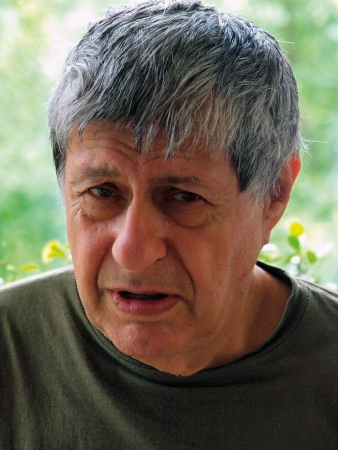
Great age also needs great murders
Another story from the Terezín ghetto is the fate of Ivan Klíma (born on September 14, 1931). He was born in Prague and is one of this country’s most widely translated authors. He is one of the leading Czech novelists, playwrights and journalists. A former dissident, co-founder of the Society of Czech Writers and the Vice-chairman of the Czech PEN Club.
He comes from a Jewish family; his father, Dr. Ing. Vilém Klíma, DrSc., was an expert in the fi eld of high-voltage electronics. His mother Marta, née Synková, remained a housewife after the birth of her sons Ivan and Jan (* 1938, now an acclaimed theoretical physicist, translator and novelist, he lives in Prague). It was autumn 1939 and the Nazis were making it clear to the Czech nation that it was time for a “new order”. The fi rst anti-Jewish measures were adopted by the end of March and society was rife with anti-Semitism.
Ivan’s father was transported to Terezín on 24th November 1941 in an AK transport (Aufbaukommando – construction squad), where 342 young men – craftsmen – had the task of preparing the barracks for the huge infl ux of people. The other transport on 10th December 1941 also brought Ivan (number L 54), his brother Jan and his mum to the Terezín ghetto. First of all they lived in barracks in Dresden, then Hamburg, and fi nally in Magdeburg, spending a year separated and then together with their father. As a specialist in the ghetto Ivan’s dad was in charge of the electrics. The two boys and their mum, who was ill for most of the time, were not deported to the East and were eventually liberated from the ghetto. Sadly, not their dad. As he was renowned throughout Europe as a high-voltage expert, before the end of the war he and two other prisoners were sent from Terezín to the Gross Rosen concentration camp with some kind of secret task. However, no one knew what this task actually was. The end of the war was in sight and the Nazis fortunately had no time for any more of their fi endish plans. Vilém was soon transferred to the camp in Mauthausen, where he spent around three days and then continued on to the Sachsenhausen camp. There he was also forced to go on a fourteen-day death march (7th April 1945), which he luckily survived, although he did not return home until the middle of June. Ivan, Jan and their mother were incredibly lucky. On 8th May 1945 their cousin appeared at the gates of the liberated ghetto and drove them and others back to Prague, to Vršovice, to their house in Ruská Street, from where they had been dragged off to Terezín three and a half years earlier. There were absolutely none of their belongings in the fl at, just things left behind by the German tenants.
In September 1945 Ivan entered the third year of grammar school and after fi nishing his studies (1951) he did a course in Czech Language and Literary Science at the Faculty of Arts at Charles University (1956). In the 1960s he worked as an editor of the periodicals Literární noviny and Listy (until they were banned). His later work was infl uenced by his working visit to the USA in 1969 and 1970. On his return he was forbidden from doing any further publishing work, so for the next twenty years he made a living mostly as a freelance writer and as a labourer. He had to publish his books either in samizdat editions or abroad. He and his wife Helena (born 1937), a psychotherapist, live in a quiet part of Prague. Their daughter Hana (born 1963) is an artist and illustrator and their son Michal (born 1960) has edited publications such as Lidové noviny. In his stories and plays Ivan Klíma has always expressed a marked distaste for our technology- ridden society, passivity and injustice. He likes hunting for wild mushrooms, enjoys being in good health, and as he himself says, does crosswords like mad.
In 2002 he was awarded the Franz Kafka Prize for his book about the life and works of Karel Čapek, entitled Velký věk chce mít též velké mordy (Great Age Also Needs Great Murders). He received the Karel Čapek Prize for his lifelong work in January 2010 and in the same year won the Magnesia Litera Award for his book Moje šílené století (My Mad Century) in the Journalism category.
For Památník Terezín Luděk Sládek
Nesouhlas se zpracováním Vašich osobních údajů byl zaznamenán.
Váš záznam bude z databáze Vydavatelstvím KAM po Česku s.r.o. vymazán neprodleně, nejpozději však v zákonné lhůtě.